|
Sometimes a thought begets a memory, and thinking about race issues in the 1960's portrayed in "The Butler" brought me back to memories of my own childhood in the 1950's and 60's. Not that there were any race issues in my life that I knew of. There was only my happy little existence with my parents and siblings and neighborhood friends and, of course, Barbara. I remember the first time I met Barbara. I must have been about four years old, and I remember her coming through the front door of our Barnett Street row house into the living room, crouching behind a chair then popping out at me, which made me laugh. So, of course, she did it again. Which made me laugh again. I don't remember how many times Barbara had to pop out from behind the living room chair to win me over, but I believe I must have been won over pretty quickly, as I can't remember one minute of ever not having loved Barbara. I never thought to question why Barbara suddenly came into our lives when she did. It was only years later when I was an adult that I learned why Barbara came, when my mother started talking about the time that she, as she called it, "went off the deep end". What my mother was going through is now well known as post-partum depression, probably brought on by having had my two younger brothers within 18 months of each other and coming home from the hospital with no one there to help her with the cooking, laundry, cleaning, and care of a newborn and three small children. But a couple of older neighbor women, though they didn't know the medical diagnosis for my mother's problem, knew well enough what she was going through, and my mother credits them with saving her life. Now, let me stop and point out that those were the days when an urban Philadelphia neighborhood of row houses such as ours was a socio-economic mix; my father was a doctor with a practice in our basement and we lived across the street from an undertaker but next door to a Planter's' Peanut factory worker who lived next door to a fireman who lived next door to a handyman. Therefore one neighbor might be able to hire a house cleaner while another might be a house cleaner. 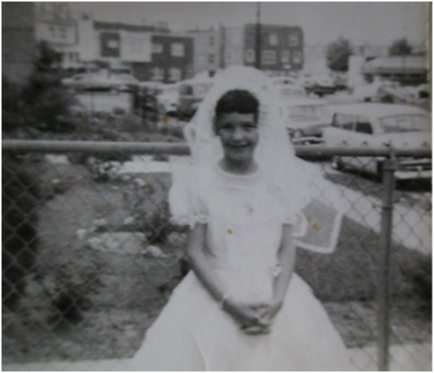 This is the closest I could get to a photo of our Barnett Street neighborhood in Northeast Philadelphia: our next-door neighbor, Rosebud, standing in our front yard on her first communion day. Can you see the marquee of the movie theater at the end of our block? 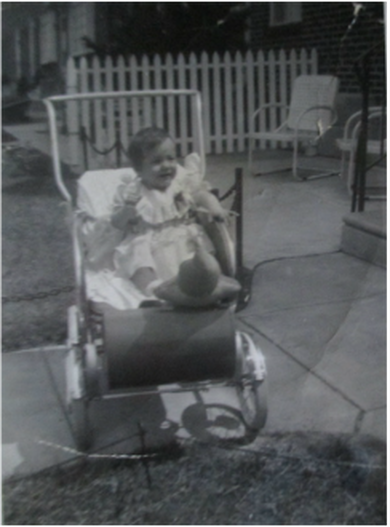 This is me as a baby, not in our yard, but in a yard a couple 'hoods over. Anyway, on one particularly dark afternoon for my mother one of these older women, the undertaker's wife from across the street, prevailed upon the African American woman she'd hired to clean her house that day to instead go over and help my mother. That was the day Barbara came into our life.
From then on Barbara came over every Thursday morning and took care of us all day long while my mother had a day out to herself. I likewise never thought to ask where my mother went every Thursday. What difference did it make? On Thursdays Barbara was our mother. And soon, our mother's life support. Besides every Thursday, Barbara began coming more often. She was the only babysitter we ever had from then on. It seemed that for every family occasion, or every family emergency, Barbara was there, working not so much for my mother as with my mother. She and my mother often cleaned our house together, sewed together, cooked together, always talking and laughing together. Sometimes Barbara would come over just to talk and have a cup of tea. Sometimes my mom would go over to Barbara's house for a cup of tea. Sometimes I would go, too. And when my mother brought her fifth baby, my sister Romaine, home from the hospital, this time Barbara was there to help her, to keep her from falling into that dark place she'd been after the birth of her previous child. One of my favorite childhood stories is of the day Barbara for some reason needed to pick up Romaine from school. When she arrived at the classroom door asking for Romaine the teacher asked my sister who this person was. Now, Romaine was only 6 years old and didn't exactly know who Barbara was, other than that she was, well... Barbara. She knew that Barbara wasn't our mother...but might she be our grandmother? (We didn't really know our grandmothers, so little Romaine wouldn't have had a clear idea of what one looked like, or how old one had to be - Barbara was only a few years older than our mother). Anyway, Romaine took a guess and told her teacher that Barbara was her grandmother. But, really, what did 6-year-old Romaine know about racial differences? What did any of us know about race back when we were that young? And even at that time back in the 1950's and 60's when I first started becoming aware of the color line, I never thought of Barbara as being someone different from us, or us from her...except when I started learning in the school yard, on the playground, even from the mouths of adults, that there were special words, insults, and jokes that some people of my color used to hurt people of Barbara's color. To Be continued tomorrow...
3 Comments
Romaine
5/13/2014 05:57:50 am
Barbara loved that I told the teacher she was my grandmother. She told that story almost every time I saw her - it tickled her so. Boy did she have a lovely outgoing personality with so much warmth and heart! I sure do miss her now.
Reply
Patti
5/13/2014 06:01:11 am
Me too
Reply
12/14/2022 01:27:43 am
Excellent article! Thank you for your excellent post, and I look forward to the next one. If you're seeking for discount codes and offers, go to couponplusdeals.com.
Reply
Leave a Reply. |
"Tropical Depression"
by Patti Liszkay Buy it on Amazon: https://www.amazon.com/dp/B0BTPN7NYY "Equal And Opposite Reactions"
by Patti Liszkay Buy it on Amazon: http://amzn.to/2xvcgRa or from The Book Loft of German Village, Columbus, Ohio Or check it out at the Columbus Metropolitan Library
Archives
July 2024
I am a traveler just visiting this planet and reporting various and sundry observations,
hopefully of interest to my fellow travelers. Categories |

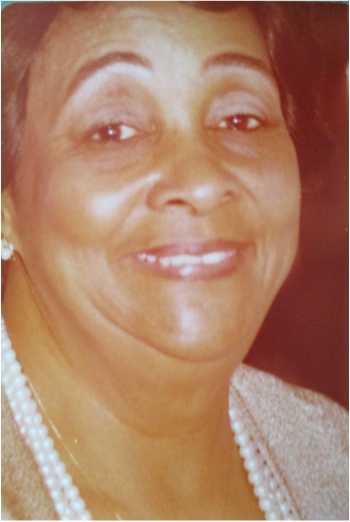


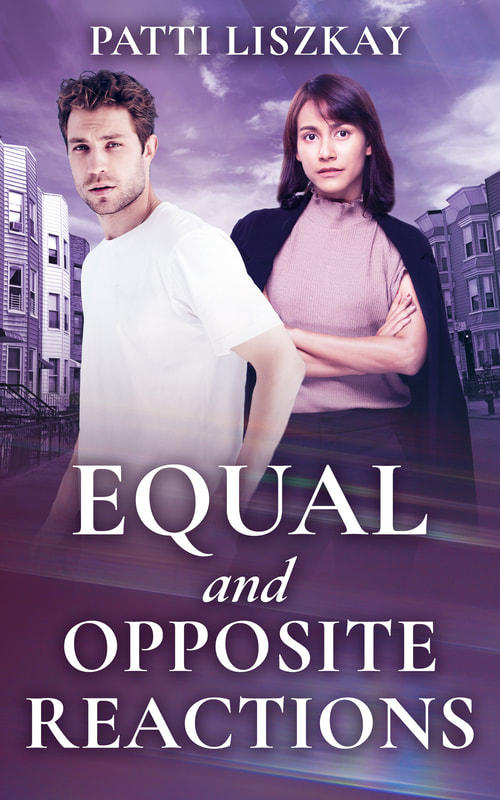
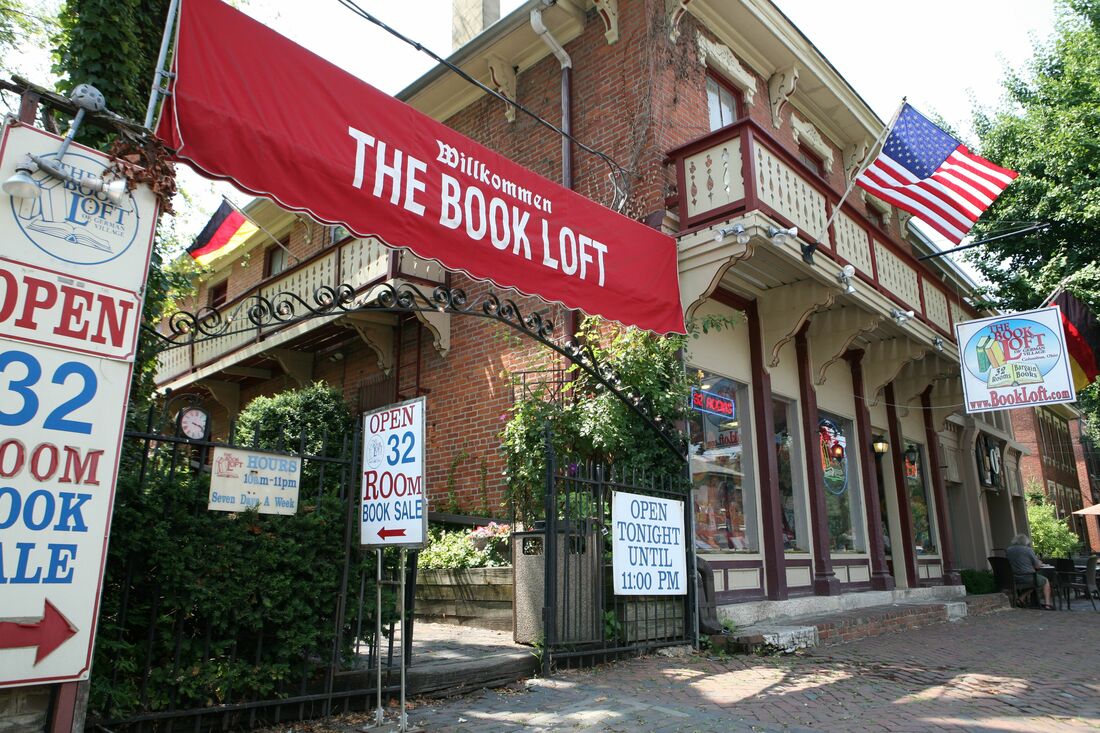

 RSS Feed
RSS Feed